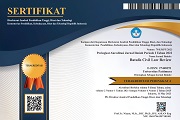Sanctions For Non-Performing Corporate Social Responsibility
 ), Rufinus Hotmaulana Hutauruk(2), Shelvi Rusdiana(3)
), Rufinus Hotmaulana Hutauruk(2), Shelvi Rusdiana(3)
(1) Faculty of Law Universitas Internasional Batam, Batam, Indonesia
(2) Faculty of Law Universitas Internasional Batam, Batam, Indonesia
(3) Faculty of Law Universitas Internasional Batam, Batam, Indonesia
 Corresponding Author
Corresponding Author
Abstract
Introduction: Companies are legal materials that have a role in national development. Its role can be realized by carrying out corporate social and environmental responsibilities as stipulated in Law Number 40 of 2007 concerning Limited Liability Companies. However, many companies neglect this responsibility.
Purposes of the Research: The purpose of this study is to analyze the sanctions related to companies that do not carry out these responsibilities.
Methods of the Research: The method in this research is normative juridical. In this study also used literature study. In terms of reviewing this research, a judical basis was used which consisted of Law Number 40 of 2007 and Government Regulation Number 47 of 2012.
Results of the Research: Based on the results of the research, it was found that the laws and regulations governing corporate social and environmental responsibility have a legal vacuum, namely that there are no clear sanctions for companies that do not carry out these responsibilities. The urgency of regulation is sanctions because by not regulating sanctions, there is an ambiguity of norms that will lead to legislative law.Keywords
DOI
10.47268/ballrev.v4i2.1751
Published
2023-12-02
How To Cite
@article{BALLREV1751,
author = {Febri Jaya and Rufinus Hutauruk and Shelvi Rusdiana},
title = {Sanctions For Non-Performing Corporate Social Responsibility},
journal = {Batulis Civil Law Review},
volume = {4},
number = {2},
year = {2023},
keywords = {Limited Company; Social Responsibility; Sanctions.},
abstract = {Introduction: Companies are legal materials that have a role in national development. Its role can be realized by carrying out corporate social and environmental responsibilities as stipulated in Law Number 40 of 2007 concerning Limited Liability Companies. However, many companies neglect this responsibility.Purposes of the Research: The purpose of this study is to analyze the sanctions related to companies that do not carry out these responsibilities.Methods of the Research: The method in this research is normative juridical. In this study also used literature study. In terms of reviewing this research, a judical basis was used which consisted of Law Number 40 of 2007 and Government Regulation Number 47 of 2012.Results of the Research: Based on the results of the research, it was found that the laws and regulations governing corporate social and environmental responsibility have a legal vacuum, namely that there are no clear sanctions for companies that do not carry out these responsibilities. The urgency of regulation is sanctions because by not regulating sanctions, there is an ambiguity of norms that will lead to legislative law.},
issn = {2746-8151}, pages = {158--167} doi = {10.47268/ballrev.v4i2.1751},
url = {https://fhukum.unpatti.ac.id/jurnal/ballrev/article/view/1751}
}
Journal Article
Astri, Herlina. “Pemanfaatan Corporate Social Responsibility (CSR) Bagi Peningkatan Kualitas Hidup Manusia Indonesia.” Aspirasi: Jurnal Masalah-Masalah Sosial 3, no. 2 (2012): 151–65. https://doi.org/10.46807/aspirasi.v3i2.265.
Aulia, M. Zulfa. “Hukum Pembangunan Dari Mochtar Kusuma-Atmadja: Mengarahkan Pembangunan Atau Mengabdi Pada Pembangunan.” Undang: Jurnal Hukum 1, no. 2 (2018): 363–92. https://doi.org/10.22437/ujh.1.2.363-392.
Damayanti, Luh Putu Damayanti. “Kekosongan Hukum Pengaturan Sanksi Dalam Peraturan Kepala Daerah (Studi Kasus UU 12/2011 Dan UU 23/2014).” Sabda Justitia 1, no. 2 (2023): 7–17.
Gumilar, Sandi, Hadiyanto A. Rachim, and Lenny Meilanny. “Tanggung Jawab Sosial Perusahaan (CSR) Studi Efektifitas Program PT. Pertamina Sehati (Sehat Ibu Dan Anak Tercinta).” In Prosiding Penelitian Dan Pengabdian Kepada Masyarakat, 4:235–40. Bandung: Departemen Kesejahteraan Sosial Fakultas Ilmu Sosial dan Ilmu Politik Universitas Padjadjaran, 2017. https://doi.org/10.24198/jppm.v4i2.14291.
Julyano, Mario, and Aditya Yuli Sulistyawan. “Pemahaman Terhadap Asas Kepastian Hukum Melalui Konstruksi Penalaran Positivisme Hukum.” Crepido 1, no. 1 (2019): 13–22. https://doi.org/10.14710/crepido.1.1.13-22.
Marnelly, T. Romi. “Corporate Social Responsibility (CSR): Tinjauan Teori Dan Praktek Di Indonesia.” Jurnal Aplikasi Bisnis 2, no. 2 (2012): 49–59.
Marthin, Marthen B. Salinding, and Inggit Akim. “Implementasi Prinsip Corporate Social Responsibility (CSR) Berdasarkan Undang-Undang Nomor 40 Tahun 2007 Tentang Perseroan Terbatas.” Journal of Private And Commercial Law 1, no. 1 (2017): 111–32.
Nasir, Gamal Abdul. “Kekosongan Hukum & Percepatan Perkembangan Masyarakat.” (Jurnal Hukum Replik 5, no. 2 (2017): 172–83. https://doi.org/10.31000/jhr.v5i2.925.
Pangestu, M. Teguh, and Nurul Aulia. “Hukum Perseroan Terbatas Dan Perkembangannya Di Indonesia.” Jurnal Business Law Review 1, no. 3 (2017): 21–39.
Pura, I Putu Wisnu Dharma, and I Nyoman Budiana. “Kebebasan Penetapan Modal Dasar Perseroan Terbatas Oleh Para Pihak Berdasarkan Peraturan Pemerintah Nomor 29 Tahun 2016.” Jurnal Analisis Hukum 1, no. 1 (2018): 32–51.
Religia, Ashar Maulana. “Permasalahan Hukum Tanggung Jawab Sosial Perusahaan (Corporate Social Responsibility) Di Indonesia.” University of Bengkulu Law Journal 4, no. 2 (2019): 183–97. https://doi.org/10.33369/ubelaj.4.2.188-201.
Ridlwan, Zulkarnain. “Negara Hukum Indonesia Kebalikan Nachtwachterstaat.” Fiat Justisia: Jurnal Ilmu Hukum 5, no. 2 (2011): 141–52. https://doi.org/10.25041/fiatjustisia.v5no2.56.
Santoso, Johari. “Perseroan Terbatas Sebagai Institusi Kegiatan Ekonomi Yang Demokratis.” Jurnal Hukum Ius Quia Iustum 7, no. 15 (2000): 194–203. https://doi.org/doi.org/10.20885/iustum.vol7.iss15.art15.
Sinaga, Niru Anita. “Hal-Hal Pokok Pendirian Perseroan Terbatas Di Indonesia.” Jurnal Ilmiah Hukum Dirgantara 8, no. 2 (2018): 17–58. https://doi.org/10.35968/jh.v8i2.253.
Susanto, Sri Nur Hari. “Karakter Yuridis Sanksi Hukum Administrasi: Suatu Pendekatan Komparasi.” Administrative Law and Governance Journal 2, no. 1 (2019): 126–42. https://doi.org/10.14710/alj.v2i1.126-142.
Tan, David. “Metode Penelitian Hukum: Mengupas Dan Mengulas Metodologi Dalam Menyelenggarakan Penelitian Hukum.” Nusantara: Jurnal Ilmu Pengetahuan Sosial 8, no. 8 (2021): 2463–78. https://doi.org/10.31604/jips.v8i8.2021.2463-2478.
Tantimin. “Pertanggungjawaban Korporasi Terhadap Pencemaran Lingkungan Hidup: Studi Pada PT Horizon Bandar Bahru Di Batam.” Journal of Judicial Review 19, no. 2 (2018): 190–206.
Book
Mertokusumo, Sudikno. Bab-Bab Tentang Penemuan Hukum. Bandung: Citra Aditya Bakti, 1993.
Muhammad, Abdulkadir. Hukum Perusahaan Indonesia. Bandung: Citra Aditya Bakti, 1999.
Soekardono, R. Hukum Dagang Indonesia. Jakarta: Dian Rakyat, 1993.| Dublin Core | PKP Metadata Items | Metadata for this Document | |
| 1. | Title | Title of document | Sanctions For Non-Performing Corporate Social Responsibility |
| 2. | Creator | Author's name, affiliation, country | Febri Jaya; Faculty of Law Universitas Internasional Batam, Batam; Indonesia |
| 2. | Creator | Author's name, affiliation, country | Rufinus Hotmaulana Hutauruk; Faculty of Law Universitas Internasional Batam, Batam; Indonesia |
| 2. | Creator | Author's name, affiliation, country | Shelvi Rusdiana; Faculty of Law Universitas Internasional Batam, Batam; Indonesia |
| 3. | Subject | Discipline(s) | |
| 3. | Subject | Keyword(s) | Limited Company; Social Responsibility; Sanctions. |
| 4. | Description | Abstract | Introduction: Companies are legal materials that have a role in national development. Its role can be realized by carrying out corporate social and environmental responsibilities as stipulated in Law Number 40 of 2007 concerning Limited Liability Companies. However, many companies neglect this responsibility.Purposes of the Research: The purpose of this study is to analyze the sanctions related to companies that do not carry out these responsibilities.Methods of the Research: The method in this research is normative juridical. In this study also used literature study. In terms of reviewing this research, a judical basis was used which consisted of Law Number 40 of 2007 and Government Regulation Number 47 of 2012.Results of the Research: Based on the results of the research, it was found that the laws and regulations governing corporate social and environmental responsibility have a legal vacuum, namely that there are no clear sanctions for companies that do not carry out these responsibilities. The urgency of regulation is sanctions because by not regulating sanctions, there is an ambiguity of norms that will lead to legislative law. |
| 5. | Publisher | Organizing agency, location | Faculty of Law, Universitas Pattimura |
| 6. | Contributor | Sponsor(s) | |
| 7. | Date | (YYYY-MM-DD) | 2023-12-02 |
| 8. | Type | Status & genre | Peer-reviewed Article |
| 8. | Type | Type | |
| 9. | Format | File format | |
| 10. | Identifier | Uniform Resource Identifier | https://fhukum.unpatti.ac.id/jurnal/ballrev/article/view/1751 |
| 10. | Identifier | Digital Object Identifier | 10.47268/ballrev.v4i2.1751 |
| 11. | Source | Title; vol., no. (year) | Batulis Civil Law Review; Vol 4, No 2 (2023): VOLUME 4 ISSUE 2, NOVEMBER 2023 |
| 12. | Language | English=en | en |
| 13. | Relation | Supp. Files | |
| 14. | Coverage | Geo-spatial location, chronological period, research sample (gender, age, etc.) | |
| 15. | Rights | Copyright and permissions | Copyright: Authors who publish their manuscripts in this Journal agree to the following conditions: 1. The copyright in each article belongs to the author, as well as the right to patent. 2. Authors are able to enter into separate, additional contractual arrangements for the non-exclusive distribution of the journal's published version of the work (e.g., post it to an institutional repository or publish it in a book), with an acknowledgment of its initial publication in this journal. 3. Authors are permitted and encouraged to post their work online (e.g., in institutional repositories or on their website) prior to and during the submission process, as it can lead to productive exchanges, as well as earlier and greater citation of published work. 4. Authors have the right to self-archiving of the article (Author Self-Archiving Policy)
Licence : Batulis Civil Law Review Journal is disseminated based on the Creative Commons Attribution-NonCommercial 4.0 International license terms. This license allows anyone to copy and redistribute this material in any form or format, compose, modify, and make derivatives of this material for any purpose. You cannot use this material for commercial purposes. You must specify an appropriate name, include a link to the license, and certify that any changes have been made. You can do this in a way that is appropriate, but does not imply that the licensor supports you or your use.
|
Copyright (c) 2023 Febri Jaya, Rufinus Hotmaulana Hutauruk, Shelvi Rusdiana

This work is licensed under a Creative Commons Attribution-NonCommercial 4.0 International License.

 : 2321 times
: 2321 times Download : 1072 times
Download : 1072 times














